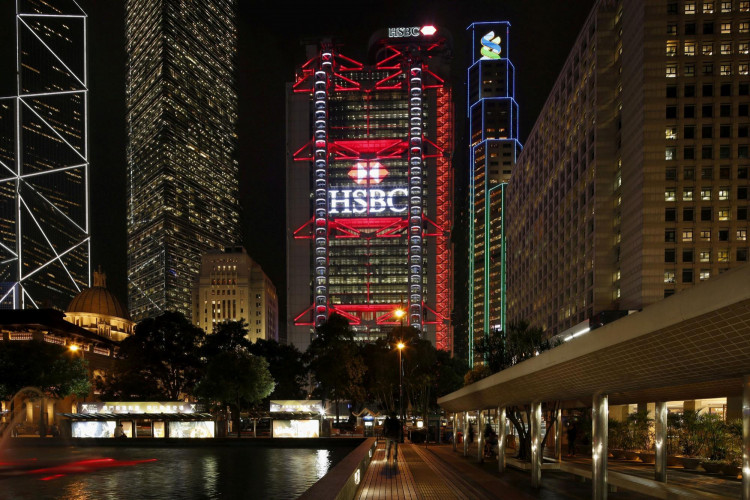HSBC Holdings PLC, one of the world's largest banks, said it would spend an additional $6 billion in Asia over the next five years as it revisits its original, and most profitable, business locations and seeks an esape from the worst business "in living memory."
It said Tuesday net profit attributable to shareholders fell 34.7% to $3.89 billion last year as the coronavirus pandemic affected the world economy. HSBC set aside $8.82 billion in provisions for bad loans last year compared with fewer than $3 billion in 2019.
Hong Kong-listed shares in the bank rose 0.43% to HK$46.70 ($6.02) on the day after jumping 3.5% ahead of the results announcement.
For the quarter ended December it swung to a $562 million profit from a $5.51 billion net loss in the same quarter of 2019.
Full-year net interest margin was 1.32% compared with 1.58% a year earlier. For the year net interest income was $27.58 billion compared with $30.46 billion - a 9.5% decline. Net fee income was down to $11.87 billion from $12.02 billion a year before - down 1.2%
For the quarter ended December net interest income was $6.62 billion compared with $7.65 billion in the same three months a year ago. Net fee income was little changed at $2.97 billion compared with $2.94 billion.
New chief executive Noel Quinn said: "We plan to focus on and invest in the areas in which we are strongest." He said the bank would spend an additional $6 billion in its wealth-management and international wholesale businesses to drive growth in Asia.
Chairperson Mark Tucker said: "In 2020, we experienced economic and social upheaval on a scale unseen in living memory. Even before the year began, the external environment was being reshaped by a range of factors - including the impact of trade tensions between the U.S. and China, Brexit, low interest rates and rapid technological development. The spread of the COVID virus made that environment all the more complex and challenging."
"The pandemic has severely impacted our customers, our colleagues, our shareholders and the communities we serve. The first priority was, and remains, dealing with the public health crisis, but the economic crisis that unfolded simultaneously has also been unprecedented in recent times."
As the pandemic hit the global economy last year, the bank prepared $8.82 billion in case of bad loans - more than double compared with 2019.
HSBC said it might sell some retail operations. HSBC said it was "exploring organic and inorganic options" for its U.S. retail business. The bank makes most of its profit in Hong Kong and mainland China. For 2020 pretax profit in Asia was $12.83 billion compared with a $4.21 billion loss in Europe and a big decline in North America to $168 million compared with $767 million 12 months earlier.
The bank has been accused in the U.S. of laundering proceeds from drug trafficking stripping data from transactions involving sanctioned nations like Iran to avoid detection. The bank paid a then-record $1.9 billion in 2012 to settle the allegations. HSBC admitted wrongdoing but avoided a guilty plea or prosecutions of its executives.
In the U.K., meanwhile, HSBC faces uncertainty caused by the country's departure from the European Union.
A second prong of the pivot to Asia will see three London-based executives - who oversee businesses accounting for roughly 95% of the bank's net revenue in 2019 - relocate to the Hong Kong HSBC offices, Bloomberg reported last week.
HSBC said it would pay a dividend of $0.15 a share. HSBC last paid out $0.30 a share in interim dividends two years ago and canceled a final expected dividend of $0.21 in early 2020 after the Bank of England banned all large lenders from paying dividends to conserve capital.
Though the bank will recommence dividend payments, they will no longer be quarterly. HSBC will instead aim for a payout ratio between 40% and 55% of reported earnings per ordinary share from 2022.






